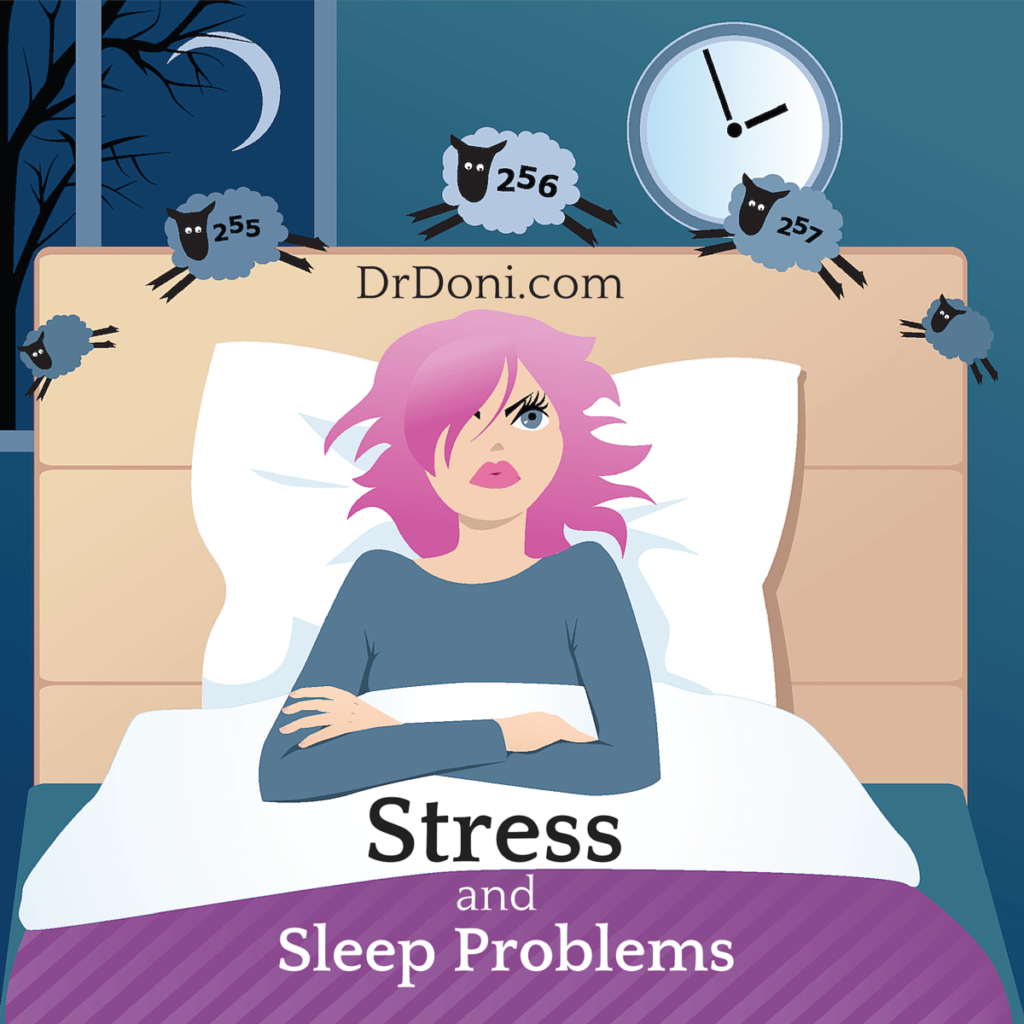
Stress and Sleep Problems
- Home
- Insomnia & Trouble Falling Asleep
- Stress and Sleep Problems

Dr. Doni, author of The Stress Remedy, explains how stress wreaks havoc on sleep. She suggests things you can do to get a good night’s sleep even while stressed.
Part 12 of Dr. Doni’s Series on Sleep Disruptors and Insomnia
 Here we are—at the end of this blog series on the things that disrupt your sleep and the steps you can take to get yourself back to sleeping well again. Since research shows that 8 out of 10 people don’t get good sleep, it is quite likely that each of us will be affected by this issue at some time or another. Whether you’re being woken by a baby or a full bladder, a hot flash or pain, blood sugar issues or noise outside your window, low melatonin and/or elevated cortisol, it all results in you not getting enough rest and recovery time, which leaves you susceptible to both immediate and long-term illness.
Here we are—at the end of this blog series on the things that disrupt your sleep and the steps you can take to get yourself back to sleeping well again. Since research shows that 8 out of 10 people don’t get good sleep, it is quite likely that each of us will be affected by this issue at some time or another. Whether you’re being woken by a baby or a full bladder, a hot flash or pain, blood sugar issues or noise outside your window, low melatonin and/or elevated cortisol, it all results in you not getting enough rest and recovery time, which leaves you susceptible to both immediate and long-term illness.
A 2007 study found that 7 out of 10 adults in the United States report experiencing stress daily, and 70% of those people have trouble sleeping. In turn, 75% then said that sleep problems increased their stress and anxiety. This shows that insomnia is both the cause and the result of increased stress, and thus it becomes a vicious cycle—the more stress you experience, the less sleep you get, and the less sleep you get, the more stressed you are.
Today we are going to talk more about stress, how it affects sleep, and what you can do about it.
Stress and Sleep
When we look more closely at stress, it becomes clear that the other 11 possible causes of sleep issues are either caused by stress, or they themselves a cause of stress, which then disrupts your sleep. Let me show you.
Stress, by my interpretation of the definition, is anything that triggers a stress response in the body and/or anything that causes the body to respond in an attempt to maintain a state of optimal health. By this definition, stress includes large and recurrent emotional/psychological stresses, as well as physical demands and imbalances in the body such as inflammation, hormone shifts, and neurotransmitter fluctuations.
Therefore, everything including staying up late to study, being exposed to light that disrupts melatonin levels, and eating foods that cause a cascade of inflammatory messengers throughout the body are all stresses that have the potential to throw off your sleep. I simplify stress in this way because I find it is then easier to accept that we are all constantly exposed to stress, and that it is a matter of finding a balance and making choices that support our bodies when they are under stress.
The main stress hormone itself, cortisol, has the potential to keep you up at night or make you feel that you can’t get out of bed in the morning. It provides a perfect example of how we can support our bodies while under stress. We can choose activities, such as those I describe in my eBook, Stress Remedies, that help bring our cortisol levels back to optimal. We can also take nutrients and herbs that help our adrenal glands produce the right quantity of cortisol throughout the day (more in the morning, gradually reducing through the day). You can read more about cortisol and sleep here.
What can you do?
-
Assess your stress – what is causing you stress and how is it affecting YOUR health?
You can either complete this stress quiz right here on my website, or you could complete the full stress assessment in my book, The Stress Remedy, which will also be able to tell you whether you need to be looking at leaky gut, blood sugar issues, and/or adrenal distress.
-
Test your cortisol, adrenaline and neurotransmitter levels
To get these tests done, you’ll need to see a naturopathic or functional practitioner who is familiar with the testing and will be able to assist you with interpreting and addressing the results. Neurotransmitter levels in particular, are often missed but are key to understanding your sleep.
-
Test your hormone levels
While completing the salivary cortisol panel, you may also need to check your melatonin levels as well as estrogen and progesterone, and/or testosterone to see if they are playing a role. This way you’ll have a full picture of how these hormones are influencing your sleep.
-
Get some blood tests
Check your blood levels of thyroid stimulating hormone, glucose, HgbA1c (average blood sugar), and nutrient levels, such as magnesium (RBC magnesium), iron (ferritin), folate (RBC folate), and vitamin B12 (represented as methylmalonic acid). Nutrient deficiencies and/or blood sugar or hormone imbalances revealed in blood work can be addressed thus benefitting your sleep.
-
Test for food sensitivities
Next, do an IgG and IgA food panel if you haven’t already, so you can find out if there are any foods that are playing a role in your sleep issues. You’ll want to contact a naturopathic/functional medicine practitioner, or you can order a kit here and complete it at home.
-
Piece together the puzzle
You’ll want to do all this with your practitioner, who will be able to help you prioritize and identify your first steps. It can be tempting to make a whole lot of changes all at once, but for many that can be too overwhelming, especially if you don’t feel well. So keep the big picture in mind, but integrate the information bit by bit until it is working like a symphony for your health.
-
Don’t give up
If one nutrient or trial of a product doesn’t quite go as expected, learn from it and move on to the next. Being hard on yourself and stopping yourself from trying again will only keep you stuck where you are. Patients who honor positive changes and learn from setback are the ones who achieve their goals the soonest.
-
Pay attention to your body
Be aware of your body; learn how stress affects it and what works to help keep you in balance with stress. Good sleep is one of the best things we can do to help our bodies stand up to daily stress which is why it is so imperative we sort out anything that is causing you to have less than optimal sleep. If you would like to receive a FREE email series, with an email every other day for 10 days, to walk you through the process, click here.
Closing Thoughts
By understanding stress and how it affects your sleep, you’ll be well on your way to better sleep. Take simple steps each day with the intention of getting to bed at your best time for sleep and waking well-rested. Here are a few ideas for you:
- Determine your desired bedtime and then make a list of the activities that stop you getting to bed at that time. Can those activities be done at a different time of day?
- Does your bedroom support your sleep? Is it clean, uncluttered, dark, cool, and quiet?
- Eat a meal with protein as well as carbs and fats in the evening, at least two hours before bed. This way you’ll have time to digest it before sleep, and it won’t cause a blood sugar spike and drop during the night that could wake you up.
- Avoid foods that disrupt your sleep including sugar, caffeine, alcohol, and any foods you know cause inflammation for you (gluten and dairy, for example).
- Take the evening supplements* that address your situation, whether to lower elevated cortisol, calm high glutamate levels, or raise low melatonin or serotonin.
By taking these steps, you’ll minimize stress on your body and mind, and achieve the restorative sleep that you and your body so desire.
For those of you who want to dive into understanding why you have sleep issues and start implementing changes to improve your sleep, I am developing a Natural Sleep Solutions Package, which includes the steps mentioned above along with support from me. This package will be available very soon. To be among the first to find out when it is available, sign up for my newsletter here.
Thank you so much for joining me in this blog series. If you would like more details on any one of the 12 potential causes of insomnia, you can find the whole series here.
–Dr. Doni
26th February 2015
—
Dr. Doni’s Natural Sleep Solutions Package
 I designed a special 4-month naturopathic treatment package to address the very issues outlined here in this post (and in this whole series on sleep).
I designed a special 4-month naturopathic treatment package to address the very issues outlined here in this post (and in this whole series on sleep).
This rigorous program will help you identify the underlying cause of your sleep issues, construct a natural remedy plan that will reduce or eliminate your symptoms, and design a long-term health regime to help you get restful sleep and restore your quality of life.
For more info, please see: https://doctordoni.com/sleep-solutions.
—
*Please keep in mind that any and all supplements—nutrients, herbs, enzymes, or other—should be used with caution. My recommendation is that you seek the care of a naturopathic doctor (with a doctorate degree from a federally-accredited program) and that you have a primary care physician or practitioner whom you can contact to help you with individual dosing and protocols. If you ever experience negative symptoms after taking a product, stop taking it immediately and contact your doctor right away.
Share this Post:
Dr. Doni Wilson's Team
14 Day Detox Program
Take the Stress Type Quiz
Dr. Doni Social Media
Popular Posts


The 5 Burnout Types

Healing HPV Holistically: Dr. Doni on the Inspire Health by Jen Podcast

Recent Podcasts
Signup to receive our weekly newsletter with all the latest news, podcasts and special offers
New Book - Order Today!

SIMPLE PRACTICES for SHIFTING FROM YOUR STATE of STRESS to YOUR FLOW and FREEDOM
MASTER YOUR STRESS
RESET YOUR HEALTH
Order Now! Related Posts

What is making you susceptible to HPV?
I have been working with women who had abnormal cells on their cervix and/or vaginally, caused by HPV for over 20 years now. And while

The 5 Burnout Types
Did you know there are 5 burnout types? They are based on your Stress Type®, which is how your adrenal function has been affected by

Healing HPV Holistically: Dr. Doni on the Inspire Health by Jen Podcast
Dr. Doni was interviewed by Jen Ciszewski on the Inspire Health by Jen Podcast, talking about how to heal away HPV from your body for good.

Stress and Trauma: The Science Behind It, How It Shows Up and How to Heal: Dr. Doni on The Burn Fat and FEAST Podcast
Dr. Doni was interviewed by Sarah B. Thomas on the Burn Fat and FEAST Podcast, talking about the impact of stress and trauma on our health and what to do to recover from them.














